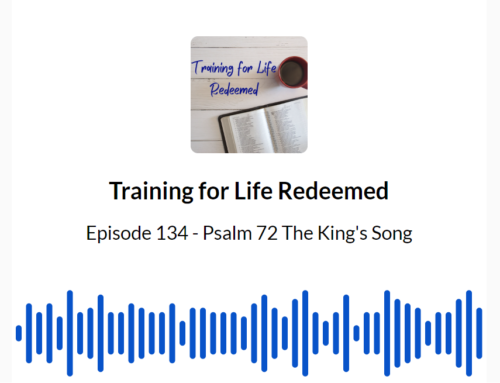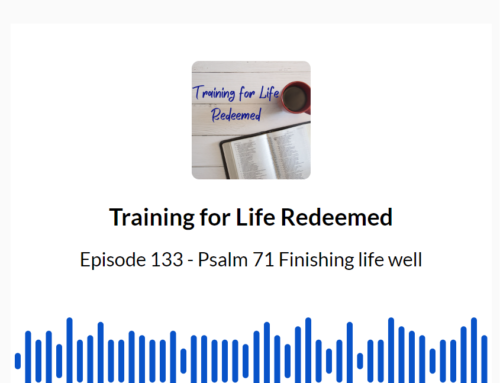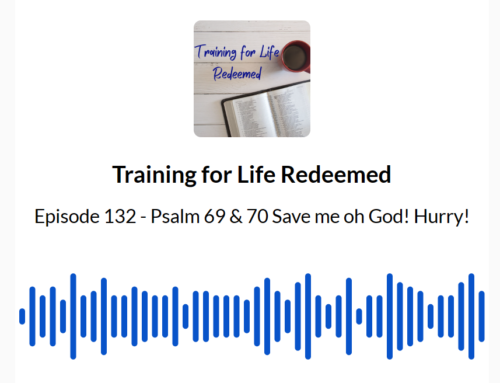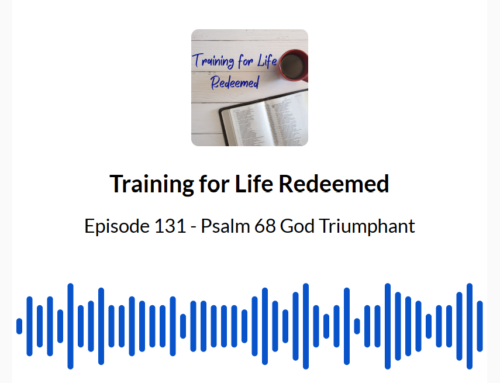Grab your notes for this episode by completing the form
and we will send you the link to all our notes.
Jesus has only three years to train a group of eye witnesses to launch the Kingdom of God from Jerusalem to the ends of the earth. He chooses Capernaum as his base, a town at the crossroads of Asia, Africa and Europe.
Transcript
Dan: (00:02)
Hi, everyone. And welcome to training for life redeemed. I’m your host, Dan, and as always, I am with my dad, David Jackson, and we are working our way through the book of Matthew today. We’re up to chapter five, we’re gonna begin the sermon on the Mount Dad and the sermon on the Mount. Give us a bit of context for it, with Jesus, doing ministry in Galilee at the moment. And then we go into this sermon on the Mount where he goes up in a mountain and just starts preaching. People have this perception that he’s there with, you know, thousands of people in front of him. And he’s up on this huge hill with them all kinda like a Moses scene. Yeah. can you give us a little bit of context and then tell me why there are so many blessed art thous throughout this first little introduction to the sermon on the mountain? Yeah,
David: (00:45)
Not quite blessed to the cheese makers.
Dan: (00:47)
Yeah.
David: (00:48)
okay, so he’s done a tour. This is his opening gambit, but he’s done a tour of Galilee, taken, the central group he’s picking up, you know, he’s picked up five guys. We’re not sure how many more he’s already picked up, but there’s been lots of people who’ve been baptised who believe in him and are following him. and then there’s the crowds. All these masses of people who’ve come to be healed. And at some point he says to the disciples, let’s get outta here and heads up a hill somewhere, Northwest probably of Capernaum. And they get up there where they can have a bit of peace and quiet and he sits down and he says, right, you’ve seen all the action and the power of the kingdom of God, all the healings and so forth. Now let me sit down and explain to you what a difference it makes when God rules, as opposed to when Satan rules.
David: (01:43)
So under the rule of sin and death, everything falls apart and we hurt each other and break everything up. Now that the king has come and we are reversing all of that. We’re undoing the damage. This is the impact that it’s gonna have on you because you’ve gotta now become part of the solution, not the problem. And for that to happen, your attitude’s gotta change. your head’s gotta get on straight. You gotta get the truth about reality, and then you gotta go out and practise it. So we’re gonna start by telling me the good news about what happens when you change your attitude and you come on board with Jesus.
Dan: (02:23)
Okay. So all the people who are blessed to those who come on board with Jesus and follow him, basically. Yeah,
David: (02:28)
This is the, so he is taken his disciples, not the crowd. Yeah. Eventually the crowd catches up. where’d he go? Where’d he go? But we pull the disciples away, the committed people, the people who believe, and we teach them now, what have you gotta do now that you are converted? What do I do? So if you go to the end of Matthews gospel, the commission is to go into all the world and make disciples. You dunk ’em when they repent and believe, and then you teach them to obey all that, I’ve commanded you. So the learning happens after the commitment. and this is now the first example we have of Jesus sitting down, doing the content, not just the action.
Dan: (03:10)
Yeah. And it is for me, I think there is an element of linking back. I mean, Matthew likes to link things back into Israel’s history and all the things, ways that Jesus is kind of like Israel and reliving Israel. And so this part of me that looks at this and goes, it’s kind of like Moses on Mount Sinai Jesus on the mountain, giving this talk and in covenants, I think there is this kind of format of, you know, there are the blessings that come with your obey. There’s the curses that come if you don’t. Yep. we don’t go straight into the curses at this point.
David: (03:42)
No,
Dan: (03:42)
But we’ve got the blessings here to, to start us off to get us feeling good. Yeah. then Jesus goes into, then talking about being the salt of the earth, being the light in the, that you don’t hide. Right. and concludes, I, I dunno if this is concluding of this section of the, or what, but he, he then talks about how he didn’t come to abolish the law yeah. To, he actually came to fulfil the law. And actually, I know Paul talks a lot about Jesus being the end of the law. And people often interpret that as it meaning the law is now finished and abolished essentially. But really I know that word telos, which is often used is, is actually just like the end of a pencil type. The end of it. It’s like the finishing of it. Yeah. Yeah. So Jesus has come to finish the law to fulfil it and, and have it complete, I guess. And so can, can you tell us a bit about this? Why have we got salt? Why have we got light? Why are we well, explicitly stating that we’re not getting rid of the law?
David: (04:40)
The Big contrast, I think, and this is where evangelical Christians have to sit up and look in a mirror and look at the text again, our first reaction to hearing the word law is to say, oh, I’m not under the law. I can ditch the whole thing. Paul said, it’s okay. and we like that because it means it gives us permission to do whatever we like. but Jesus comes out at a really different angle. He starts off these blessings that he’s pouring out. And the “”blessed ares” here in those first few verses, he’s talking about gentleness meekness. Self-control, he’s talking about peacemakers. He’s, he’s talking about a changed heart that isn’t out to see what I can get away with, that isn’t out to, to build, you know, a religious life. That’s all about me. so it it’s this sudden lose my sense of entitlement, lose my sense of, you know, all my rights and just come down and say, Jesus is Lord.
David: (05:42)
I’ve made a mess of life. How do I put this mess back together and humble, gentle, meek, kind, peace, making merciful. These are the changes of attitude. Now bring that to read your Old Testament. And when you come to read the old Testament, it’s not a bunch of random rules. It is God telling you what lights his eyes and what breaks his heart. and God doesn’t change. So whatever wherever you hear of of God saying, this is bad, this is good. That doesn’t change Old Testament. New Testament what’s changed is that at Jesus has demonstrated that he perfectly fulfilled. He kept the whole, he reflected accurately the whole character of God in everything he said and did. And then he turned around and paid for the fact that we didn’t. And so now we are able in Christ to start to learn, to get it right.
David: (06:45)
And so as we go back to the old Testament, we’re asking a different question. What would put a sparkle in the eyes of my heavenly father? When what, what would I do that would say you got it right, son? You know, that, that, looking for the father’s approval takes me back to the old Testament and says, what broke his heart? What instructions did he give? Here He is rescuing a people out of Egypt and saying, you know, that was, that was slavery re and and death to babies and all sorts of horrible things. Here’s how you get it, right, fellas. And I wanna go back and do that. I want to get it right. So we’re gonna reread the Torah, the God’s book of instruction, not as a bunch of school rules, but as my handbook for rebuilding my whole life. And now I’m searching with humble teachable, keen eyes to find out what can I learn here? How can I change? and so, you know, don’t throw out God is pedantic, the jots and the tittles. Yeah. Would
Dan: (08:02)
You like people are, yeah. When you enter into a relationship, I always think of this, you know, when you’re going back into a relationship with God and you, you want to get the relationship right. Until you go back and go, well, if I love him, then what things does he like? Cuz you know, just like you do with your husband or wife, like you, if you, you, if you love them and you’re married to them, you wanna make them happy. And so you go back through and you try and remember all the things in the past. What does she like? What does she, what does she want? You know, what’s
David: (08:29)
Her favorite colour? That’s it?
Dan: (08:31)
What food does she really like? Where should I take her for the cafes? Like which wines does she enjoy? What are her favourite flowers? You know? And it’s that kind of detail. I think like when you’re looking at the, the dot the dots and the, you know, dotting your eyes and stuff, that’s that for me is that kind of paying close enough attention to who God is to pick up those, those pieces.
David: (08:51)
A friend who I am sure has a card file index of everybody. He knows, and he’s got their birthday, what food they did or didn’t choose last time they were over how they take their coffee, just attention to detail. And when you walk into his house, he remembers everything asks the names of your grandchildren, everything he’s interested in the whole person. And that’s how we gotta look at God. Yeah.
Dan: (09:18)
Cause he knows those details about us. Oh
David: (09:21)
Doesn’t he? And then for me to, to, to worry about it’s the little things, good old, John Goldsmith. Mm God bless him. if you, you know, if you take care of the little things, the big things will take care of themselves. So we look at our, our life and we go, I’ve gotta start to get this little detail. Right. And God’s Torah is there to help me do that.
Dan: (09:41)
Yeah. Now to make sure that we don’t just pay attention to detail to get it right. Yeah. Jesus then keeps going on and he he’s gonna go through a bunch of, you have, have heard and then yeah. Quote something, you shall not what mean adultery should not murder should not have like everything. Yeah. Not quite everything, but you know, a nice succinct summary here. He does a series of these what’s he doing? As he, as he does this, is he, is he just redefining what the law is? Or is he doing something bigger than that?
David: (10:11)
He’s giving this, he’s giving his disciples a workshop. You you’ve heard this story. You’ve heard this much of the story and you’ve reacted to it the way you’ve been doing in the past. Let me show you a different way to, to read, to hear what God is saying. Now that you’ve got a heart change and your head’s on straight. What’s God actually saying when he says don’t commit murder, is he just, you know, he, as long as you can shoot at the guy and if you’re miss and, you only wounded him, you didn’t break the law. Is that how we’re gonna approach God’s word? Or are we gonna sit there and go, where was my heart when I loaded my weapon? Yeah. You know, and if I run that back, that it’s my heart that has to change, not my aim. So, you know, if, if your intention was to kill the guy you’ve murdered, you’re guilty of murder, whether you were a good shot or not.
David: (11:07)
Mm. but let’s go and ask the bigger question. If, why did I intend intending to kill him? How does that react? How does God react to that? Here’s the image of God. And I wanna destroy it. Let me go back. Do you love your enemy? Do you bring blessings to your enemy? Are you out to destroy? Are you out to restore? Jesus came to die to give us to pay the penalty for our sin so that we would have our life back when we were his enemies. So this is a different way of, you know, this is the right way to read Torah. Yeah. do I go to adultery and say, what can I get away with? Or do I go to it and say, where, how do I start to get it? Right. Yeah. and he just works you through, this is, this is a little workshop of how you used to do it wrong, and this is how you do it. Right. This is God’s original intention for how you read Torah. and so, you know, if the thing says, don’t kill the flip side of that is protect life. Yeah. and that involves love.
Dan: (12:19)
Yeah. It actually reminds me of, yeah. The multiple times when you’re teaching in class to the high school students and they’re like, so how far can I go with my girlfriend? You’re like, you’re asking the wrong question. The real question is what could you do to love your girlfriend and to love everyone else who’s gonna interact with her
David: (12:35)
To honor her and Her dignity.
Dan: (12:37)
It’s not about how far can I go before I actually break the rule, technically drawing the line in the sand. It’s actually, it’s, you need to look closer, more closely at your heart with that kind of a question to answer that. I think that’s kind of what, what Jesus is doing here as goes to,
David: (12:51)
Yeah, you’re looking at it and saying, what can I get away with is how, what can what’s what’s a benefit to me that I want to grab in my greed and lust and everything else. And it’s all about me. So rephrase the question, it’s all about God. And this is God’s person that he made. And the way I treat that person is the way I treat God. It’s not about what can I get away with. Yeah. It’s about how can I get on God’s side and build up, and bless. Yeah. When he, we started off, he blesses me now, how can I go out and be a blessing to them? And that’s the whole concept of, if you wanna be a disciple, you start by, God is love and love is selfless. Yeah. yeah. I, Jay Adams preached a brilliant sermon. He defined love as blood, sweat, tears, and a cross and laying down your life for the person you love. And I think, yeah, that Matthew five does that, in redefining the way we read the Bible.
Dan: (13:57)
Well, now that moves us to the end of this episode. If you enjoyed this episode, we would love if you would leave a review, if you would like to grab the daily notes or the study notes that go along with this episode, head over to trainingforliferedeemed.com/64. And of course, make sure you hit the so subscribe button and come back and join us again for our next episode, when we are looking at Matthew chapter six, continuing our work through Matthew and also currently the sermon on the Mount.



